Gutter Cleaning Trevose
Top 10 Roof Gutter Cleaning in Trevose
Get multiple Roof Gutter Cleaning quotes for your project today! Compare profiles, reviews, accreditations, portfolio, etc... and choose the best deal.

Ned Stevens Gutter Cleaning
4.5501 reviewsBroomall, Broomall, PA, USNed Stevens Gutter Cleaning is a trusted and reliable gutter cleaning service provider. With over 50 years of experience, we offer a wide range of services including gutter cleaning, installation, replacement, and repair. Our team of experts uses state-of-the-art equipment and techniques to ensure that your gutters are cleaned and maintained to the highest standards. We also offer additional services such as exterior house washing, deck cleaning, fence cleaning, patio cleaning, power wash - roof cleaning, siding cleaning, walkway cleaning, window cleaning, and mosquito and tick control services. With multiple locations across the United States, we are committed to providing exceptional service to our customers. Contact us today to schedule your appointment and experience the Ned Stevens difference.
- Services
- Why Us?
- Accreditations
- Our Team
- Testimonials
- Gallery
Get Quote
Gutter Doctor
4.4124 reviewsAllentown, USNed's Home recently acquired Gutter Doctor. For over 50 years, our organization has continually grown, serving customers in over 18 states. Honoring the tradition of hard work and quality services, we work 7 days a week to ensure every customer is happy. With crews receiving hands-on and rigorous training in our state-of-the-art facility, we fully guarantee every job we perform. Carrying full worker’s compensation and liability insurance, we let you rest easy knowing you’re not only protecting your home but yourself as well. How does the purchase/acquisition benefit customers? Expanded Gutter Replacement and Cleaning Services Access to More Exterior Home Maintenance Professionals Ned’s Home Has an A+ Rating With the Better Business Bureau Ned’s Home Has Earned the Home Advisor Elite Service Status Ned’s Home Has Earned the Angie’s List Honor Roll Award Access to Gutter Cleaning Professionals that Are a Part of the National Rain Gutters Contractor Association (NRGCA) At our company, we are proud to be recognized as the Gutter Doctor. This title was earned through our unwavering dedication to upholding the highest standards of professionalism, as well as our meticulous attention to detail in every aspect of our work. We believe that exceptional customer service is not just a goal, but a requirement, and we strive to provide our customers with the best possible experience from start to finish. Whether it’s repairing, cleaning, or installing gutters, we take pride in our work and are committed to ensuring that our customers are completely satisfied with the results. Full Insurance Coverage We take pride in providing fully insured gutter installation and repair services to our customers, ensuring that they are protected and giving them the peace of mind they deserve. Our insurance coverage is designed to protect both our customers and our employees. 30 Years of Experience We have been serving Pennsylvania, Delaware, and New Jersey, for over 30 years. Our extensive experience has taught us the ins and outs of the industry, and we are committed to using this knowledge to provide exceptional service to our customers. Our Mission At Ned’s Home, our mission is to provide our customers with the highest level of service possible. We work hard every day, 7 days a week, to ensure that every job is done right and every customer is happy. Our ultimate goal is to earn your trust and become your go-to provider for all your gutter and home service needs.
- Services
- Why Us?
- Accreditations
- Gallery
Get Quote
Pro Surface Clean
538 reviewsEast Elmhurst, NY, 32-60 85th Street, 11370, USAt Pro Surface Clean, we provide a wide range of services to keep your property looking its best. From house washing to roof washing, driveway pressure washing to sidewalk pressure washing, and gutter cleaning to window cleaning, we have you covered. Our team of experts uses the latest techniques and equipment to ensure a thorough and efficient cleaning process. We also offer additional services such as deck cleaning, patio and yard deep cleaning, and slate tile surface cleaning. With our commitment to quality and customer satisfaction, you can trust Pro Surface Clean to get the job done right.
- Services
- Why Us?
- Accreditations
- Our Team
- Testimonials
- Gallery
Get Quote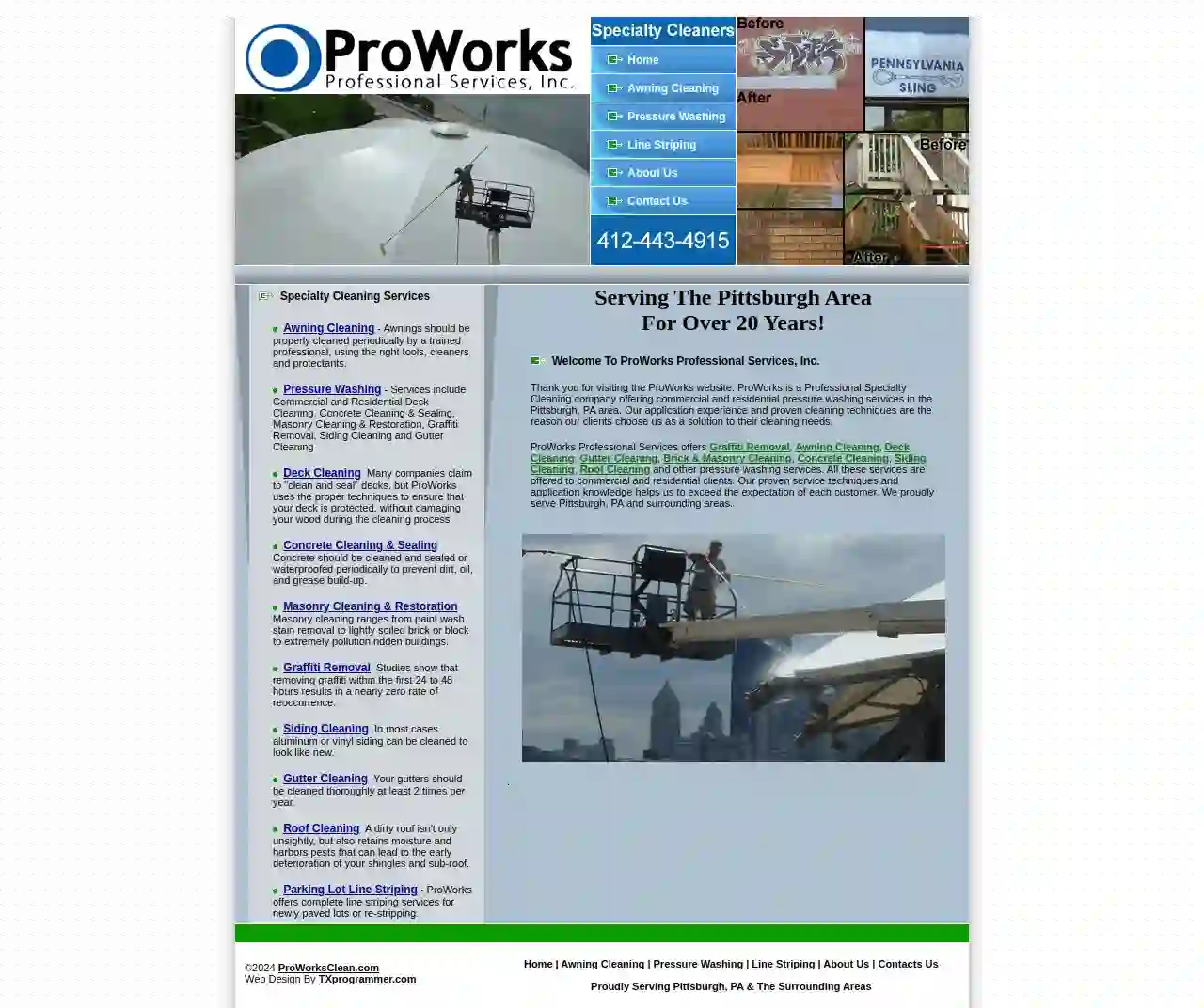
Proworks Graffiti Removal Services
Gibsonia, 15044, USWelcome To ProWorks Professional Services, Inc.Thank you for visiting the ProWorks website. ProWorks is a Professional Specialty Cleaning company offering commercial and residential pressure washing services in the Pittsburgh, PA area. Our application experience and proven cleaning techniques are the reason our clients choose us as a solution to their cleaning needs.ProWorks Professional Services offers Graffiti Removal, Awning Cleaning, Deck Cleaning, Gutter Cleaning, Brick & Masonry Cleaning, Concrete Cleaning, Siding Cleaning, Roof Cleaning and other pressure washing services. All these services are offered to commercial and residential clients. Our proven service techniques and application knowledge helps us to exceed the expectation of each customer. We proudly serve Pittsburgh, PA and surrounding areas.
- Services
- Why Us?
- Our Team
- Gallery
Get Quote
McNelis Gutter Cleaning Inc
4.110 reviews653 Ross Street, Harrisburg, 17110, USFULLY INSURED | FAMILY OWNED & OPERATED McNelis Gutter Cleaning serves Harrisburg, Camp Hill, Mechanicsburg and all around South Central Pennsylvania. For over 10 years we’ve provided fully insured, expert gutter cleaning and gutter maintenance to the Susquehanna Valley. We excel in quality, safety, and detailed precision when it comes to cleaning gutters. All of our expert work on your gutters is guaranteed. Free Quote Why do I need to clean my gutters? Gutters are an integral part of your roofing system and require regular maintenance to help prevent damage from all types of elements. Properly functioning gutters direct rainwater away from the foundation of your home and are the best line of defense against water seeping into your home. Gutters clogged with leaves, twigs, or the tennis ball your neighbor’s son tossed up there will cause them to malfunction, potentially resulting in water damage. What happens if I neglect cleaning my gutters? Water damage Properly functioning gutters direct water away from the foundation of your home, however clogged gutters can cause water to collect and seep into your basement. Loosened gutters The extra weight of water, leaves, and other debris can loosen gutters and cause them to start pulling away from the roof and other attachments. Gutters don't make for great lawn ornaments. Ice dams We live in an area where it freezes during the winter. Your clogged gutters can cause water to flow over the edge of a gutter and then freeze, forcing water into your home. Ice dams can become so heavy they can rip the gutter right off your home, resulting in costly repair bills. We will happily reinstall your gutters if that happens, but we prefer to just clean them! Pests Clogged gutters can become an attractive home to carpenter ants, mosquitoes and even rodents. This isn't a good thing unless you are lonely and are in need of a couple new roommates. What is the gutter cleaning process? Clear Roof First we remove any debris that has accumulated on your roof since last gutter cleaning. Scoop Gutters Next, we scoop the gutters by hand removing any leaves, twigs, and other debris that has built up. Rinse After all debris has been removed, we rinse the gutters removing everything left behind including grit and dirt. Downspouts Next, we make sure each downspout is flushed thoroughly and checked to ensure proper flow and zero obstructions. Clean Up Finally, we remove and haul away all of the debris. Other Home Services Interior and Exterior Painting At McNelis Gutter Cleaning you get prompt, professional service when it comes to more than just cleaning gutters. If you need your home painted quickly at a low, competitive price, we are the ones to call. With over 10 years of experience, we can handle virtually any indoor or outdoor painting job. Deck Staining McNelis Gutter Cleaning provides top-notch power washing, staining, sealing, and maintaining of your decks, fences and other wood amenities. We have access to the best resources and products around to give our customers a truly enjoyable, hassle free experience at affordable prices. Power Washing Power washing is an effective way to keep many tough outdoor areas clean. We offer a wide variety of commercial, residential and industrial power washing services to the greater Harrisburg area at affordable prices. Power washing regularly will make your property shine and help prevent stains and damage caused by wear and tear. From our hot water cycle to lower pressure cycles for more delicate jobs, McNelis Gutter Cleaning will blast away the dirt and debris from your property, vehicles or machines. Roof and Skylight Cleaning There is no more effective way to maintain or improve the attractiveness of your home than by keeping the exterior looking great, including your roof. Over time many roofs in the Susquehanna Valley start to accumulate black patches and streaks that make them look dirty. Those black patches and streaks that you see on your roof are almost always the result of an unwelcome guest, an algae called Gloeocapsa Magma, that feeds on your shingles and spreads all over your roof. Our soft wash roof cleaning process removes all traces of this algae. Free Estimate We offer free estimates for our services. Someone from our experienced staff will contact you once the form below is completed. Most of the time we can provide an estimate over the phone after we review the scope of the project, however other times we may need to visit the property before we can provide an estimate.
- Services
- Why Us?
- Our Team
- Gallery
Get Quote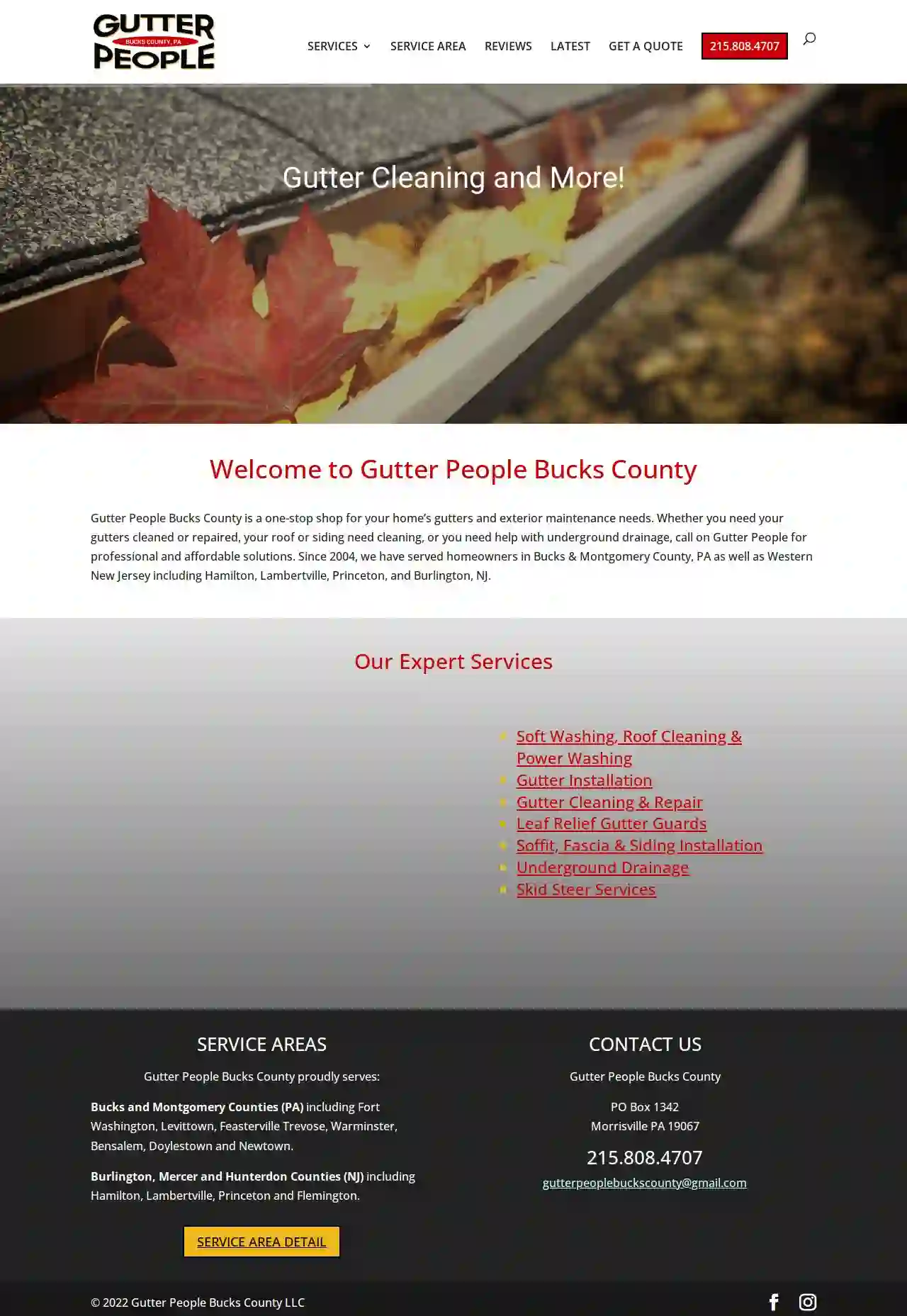
Gutter People Bucks County LLC
4.37 reviewsPO Box 1342, Morrisville, 19067, USWelcome to Gutter People Bucks County. Gutter People Bucks County is a one-stop shop for your home's gutters and exterior maintenance needs. Whether you need your gutters cleaned or repaired, your roof or siding need cleaning, or you need help with underground drainage, call on Gutter People for professional and affordable solutions. Since 2004, we have served homeowners in Bucks & Montgomery County, PA as well as Western New Jersey including Hamilton, Lambertville, Princeton, and Burlington, NJ.
- Services
- Why Us?
- Gallery
Get Quote
All Complete Construction
4.777 reviewsGreat Meadows, 5 Danielle Drive, 07838, USAt All Complete Construction, we take pride in our hard work and dedication to detail. We have over eighteen years of experience and can take on any job no matter the size. We value every single customer and treat each job with careful attention. We look forward to working with you soon! We are a family owned business: “I chose to work in this industry because I always had an interest in building. As a young boy, I would spend hours building houses made out of mud in my backyard. But it wasn’t until I watched my father build our home, that I realized construction was my passion.”
- Services
- Why Us?
- Accreditations
- Gallery
Get Quote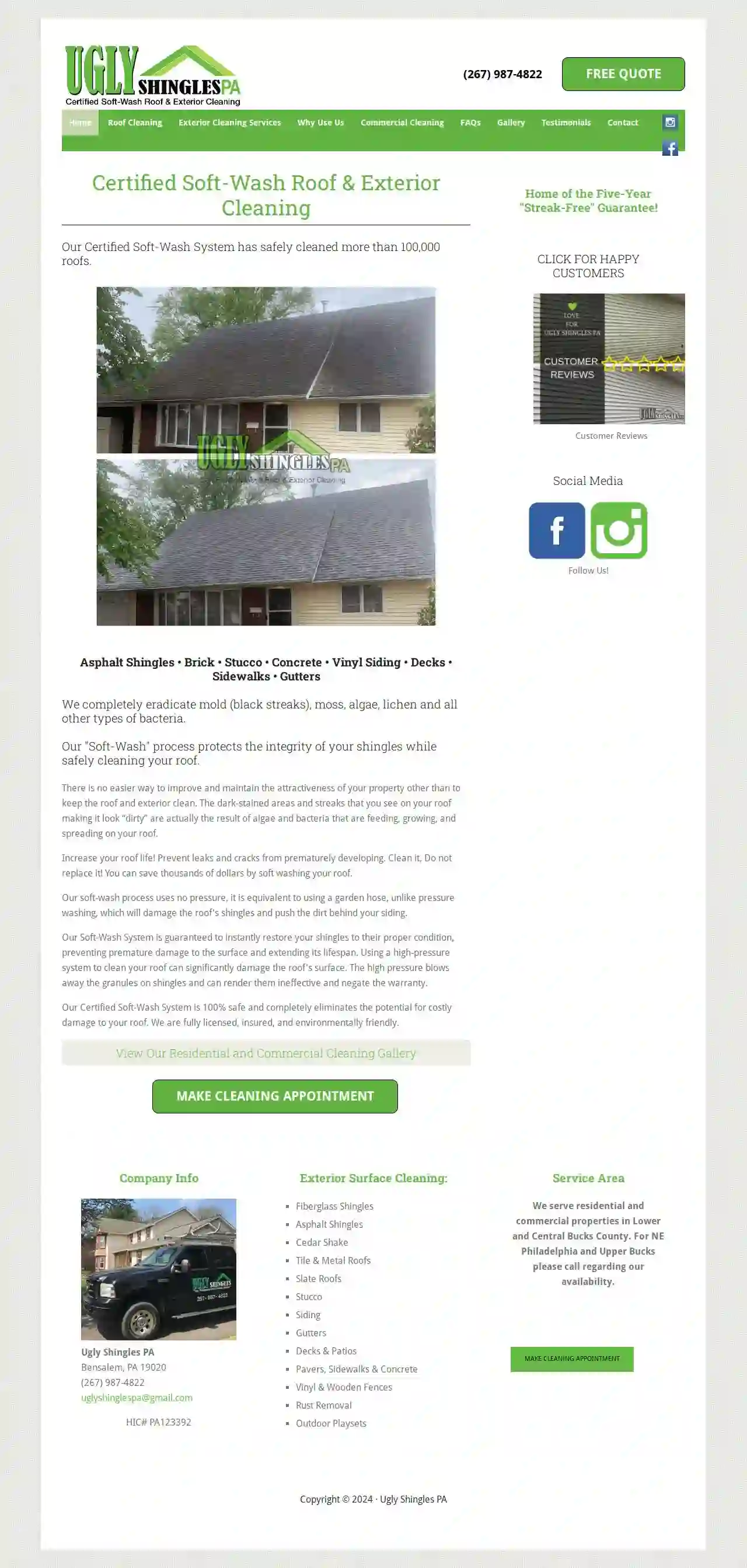
Ugly Shingles PA
535 reviewsBensalem, 19020, USUgly Shingles PA is a certified soft-wash roof and exterior cleaning company serving residential and commercial properties in Lower and Central Bucks County. We have safely cleaned over 100,000 roofs using our proven soft-wash system. Our process effectively eliminates mold, moss, algae, lichen, and other bacteria from asphalt shingles, brick, stucco, concrete, vinyl siding, decks, sidewalks, and gutters. Unlike pressure washing, our soft-wash method is gentle on your roof, preventing damage and extending its lifespan. We are fully licensed, insured, and environmentally friendly. We offer a five-year "Streak-Free" Guarantee and are committed to providing exceptional customer service.
- Services
- Why Us?
- Accreditations
- Gallery
Get Quote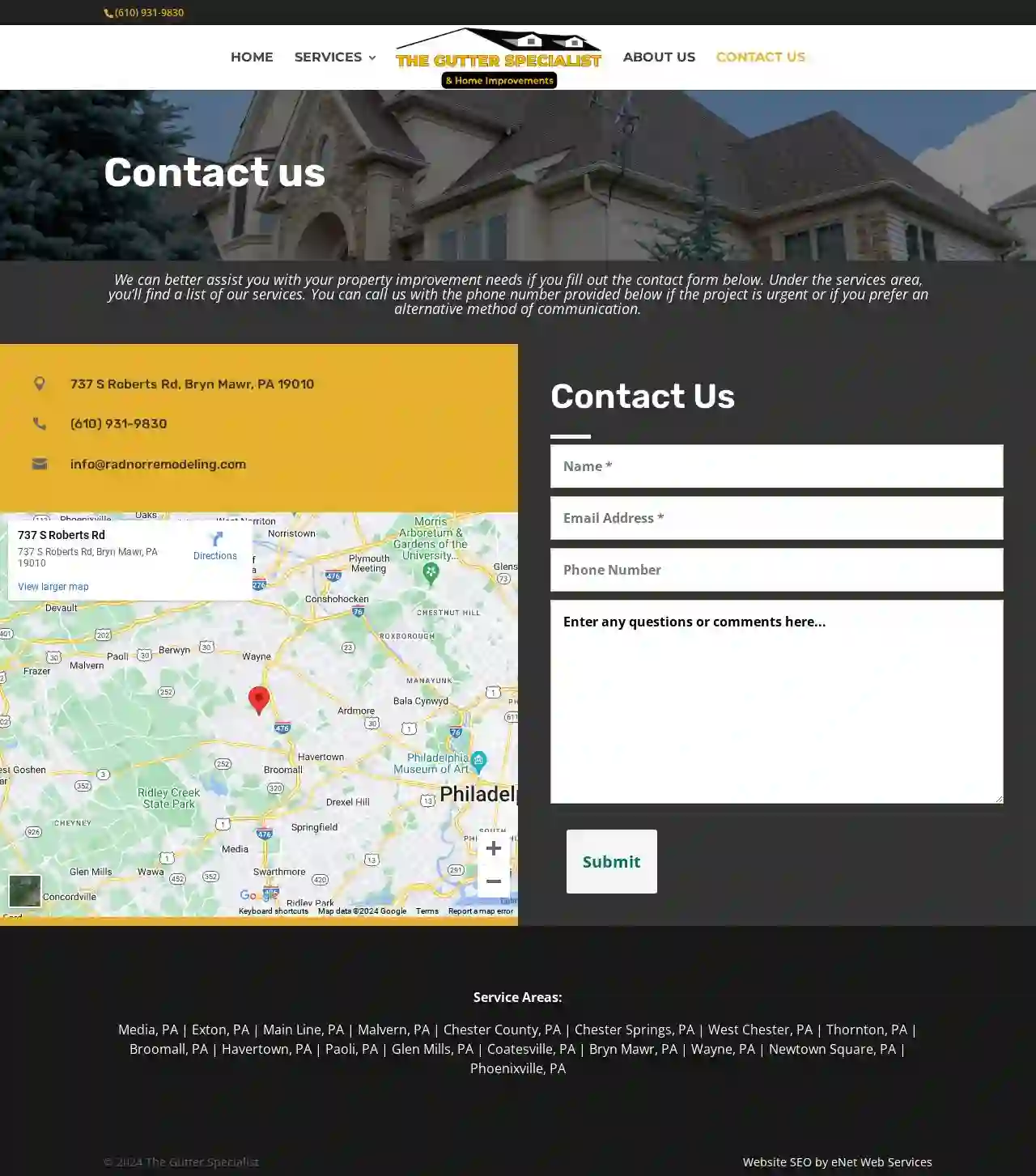
The Gutter Specialist
737 S Roberts Rd, Bryn Mawr, 19010, USThe Gutter Specialist is much more than just a name. We are proud to provide a wide range of home improvement services. All properties, whether commercial or residential, are serviced by us! Having experience in a wide range of home improvement services has given us a distinct advantage in this industry. It is our responsibility to be your one-stop-shop for home renovation. We excel at helping homes reach their full potential through the roofing, siding, exterior remodeling, and gutters. Do you have an issue or a question? Now is the time to call!
- Services
- Why Us?
- Testimonials
- Gallery
Get Quote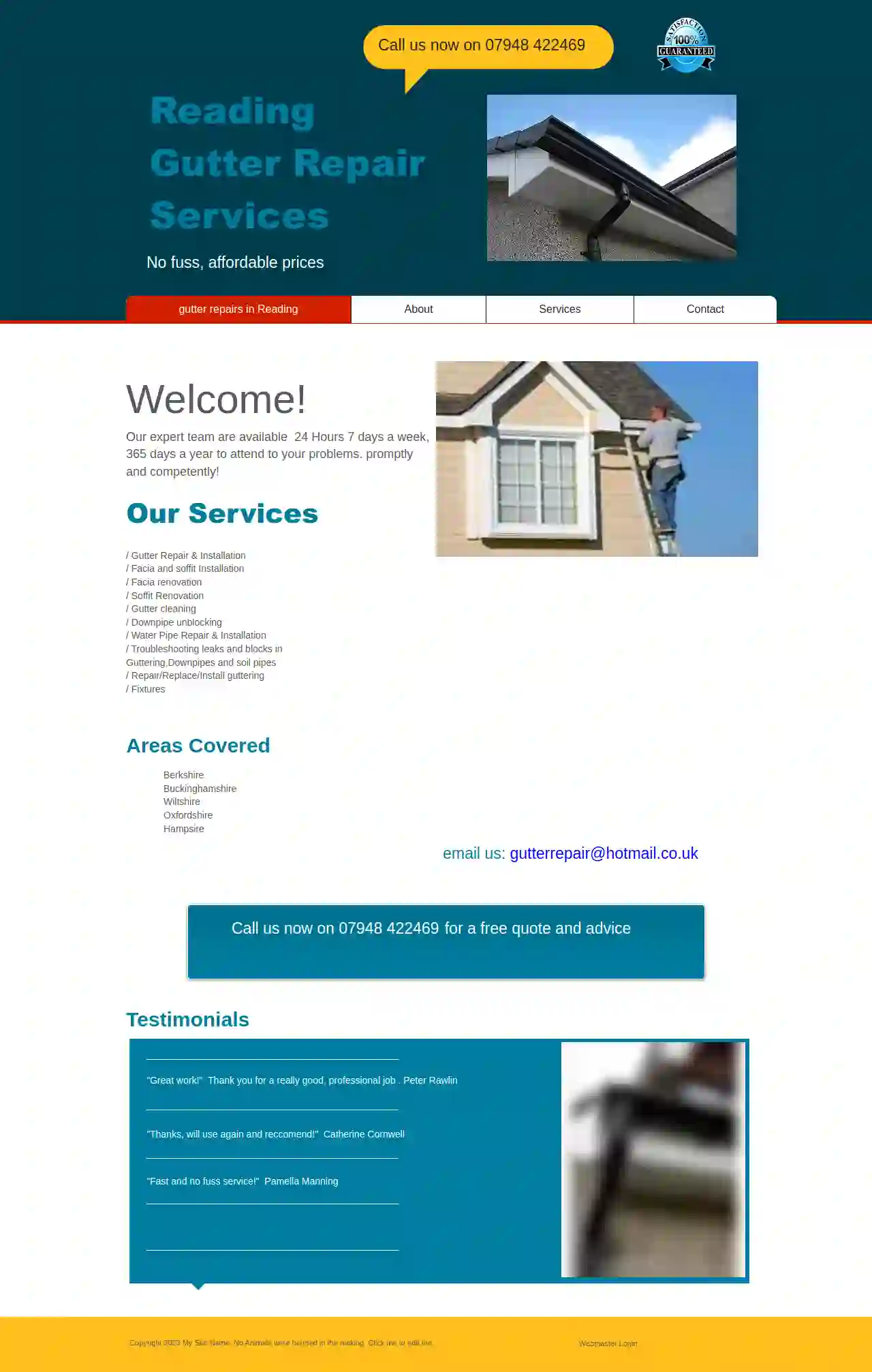
Reading Gutter Repair Services
3.54 reviewsReading, USWelcome to Reading Gutter Repair Services! We offer a range of services to keep your gutters in top condition. Our expert team is available 24/7, 365 days a year to attend to your problems promptly and competently. We cover areas such as Berkshire, Buckinghamshire, Wiltshire, Oxfordshire, Hampshire, and more. Contact us for a free quote and advice.
- Services
- Why Us?
- Testimonials
- Gallery
Get Quote
Over 60,241+ Janitorial Businesses onboarded
Our cleaning service providers operate in Trevose and beyond!
CleaningMatch has curated and vetted Top Janitorial Services arround Trevose. Find a top & reliable business today.
Frequently Asked Questions About Gutter Cleaning
- Small House: Cleaning gutters on a small, single-story house may take 1-2 hours.
- Large or Multi-Story House: Cleaning gutters on a larger or multi-story house can take 3-4 hours or more.
- Ladders and Safety Equipment: They use sturdy ladders and safety harnesses to access gutters safely.
- Gutter Scoops and Hand Tools: They use gutter scoops, trowels, and other hand tools to remove leaves, twigs, and debris from gutters.
- Blowers and Vacuums: They may use blowers or vacuums to remove lighter debris and leaves from gutters and downspouts.
- Pressure Washing: Some gutter cleaners use pressure washers to flush out stubborn debris and clean the gutters thoroughly.
- Debris Disposal: They bag and dispose of the collected debris properly.
- Prevent Ice Dams: Clogged gutters can contribute to the formation of ice dams in the winter, which can trap heat inside your attic, leading to higher energy bills.
- Protect Insulation: Overflowing gutters can cause water to seep into your attic, damaging insulation and reducing its effectiveness.
- Prevent Mold Growth: Clogged gutters can lead to moisture buildup, creating a favorable environment for mold growth, which can affect indoor air quality and require energy-intensive remediation.
- Cracks or Holes: Inspect gutters for cracks, holes, or splits, which can allow water to escape and cause damage.
- Sagging or Pulling Away: Gutters that are sagging, pulling away from the house, or misaligned indicate loose fasteners, improper installation, or excessive weight from debris.
- Rust or Corrosion: Rust or corrosion can weaken gutters and lead to leaks.
- Leaking Seams: Check for leaks at the seams of sectional gutters, which can indicate worn-out sealant or improper joint connections.
- Damaged Downspouts: Inspect downspouts for cracks, holes, or separation from the gutters, which can disrupt water flow and cause damage.
How long does it take to clean gutters?
Additional services like gutter repair or gutter guard installation will add to the overall time required.
How do professional gutter cleaners clean gutters?
Professional gutter cleaners have the experience, equipment, and knowledge to ensure thorough and safe gutter cleaning.
Can gutter cleaning improve my home's energy efficiency?
By preventing these issues, gutter cleaning indirectly supports energy efficiency in your home.
How can I tell if my gutters are damaged?
If you notice any signs of damage, contact a professional gutter repair company to assess the issue and recommend the necessary repairs.
How long does it take to clean gutters?
- Small House: Cleaning gutters on a small, single-story house may take 1-2 hours.
- Large or Multi-Story House: Cleaning gutters on a larger or multi-story house can take 3-4 hours or more.
Additional services like gutter repair or gutter guard installation will add to the overall time required.
How do professional gutter cleaners clean gutters?
- Ladders and Safety Equipment: They use sturdy ladders and safety harnesses to access gutters safely.
- Gutter Scoops and Hand Tools: They use gutter scoops, trowels, and other hand tools to remove leaves, twigs, and debris from gutters.
- Blowers and Vacuums: They may use blowers or vacuums to remove lighter debris and leaves from gutters and downspouts.
- Pressure Washing: Some gutter cleaners use pressure washers to flush out stubborn debris and clean the gutters thoroughly.
- Debris Disposal: They bag and dispose of the collected debris properly.
Professional gutter cleaners have the experience, equipment, and knowledge to ensure thorough and safe gutter cleaning.
Can gutter cleaning improve my home's energy efficiency?
- Prevent Ice Dams: Clogged gutters can contribute to the formation of ice dams in the winter, which can trap heat inside your attic, leading to higher energy bills.
- Protect Insulation: Overflowing gutters can cause water to seep into your attic, damaging insulation and reducing its effectiveness.
- Prevent Mold Growth: Clogged gutters can lead to moisture buildup, creating a favorable environment for mold growth, which can affect indoor air quality and require energy-intensive remediation.
By preventing these issues, gutter cleaning indirectly supports energy efficiency in your home.
How can I tell if my gutters are damaged?
- Cracks or Holes: Inspect gutters for cracks, holes, or splits, which can allow water to escape and cause damage.
- Sagging or Pulling Away: Gutters that are sagging, pulling away from the house, or misaligned indicate loose fasteners, improper installation, or excessive weight from debris.
- Rust or Corrosion: Rust or corrosion can weaken gutters and lead to leaks.
- Leaking Seams: Check for leaks at the seams of sectional gutters, which can indicate worn-out sealant or improper joint connections.
- Damaged Downspouts: Inspect downspouts for cracks, holes, or separation from the gutters, which can disrupt water flow and cause damage.
If you notice any signs of damage, contact a professional gutter repair company to assess the issue and recommend the necessary repairs.